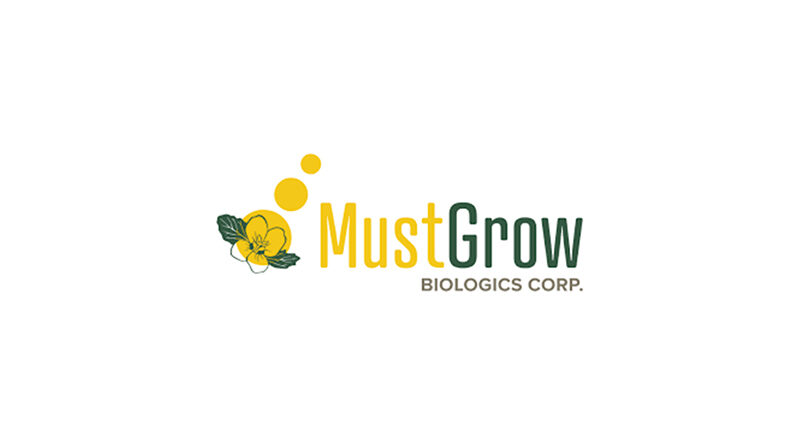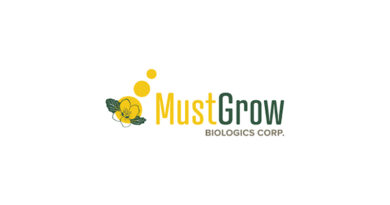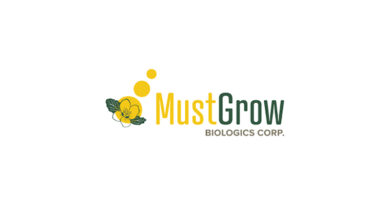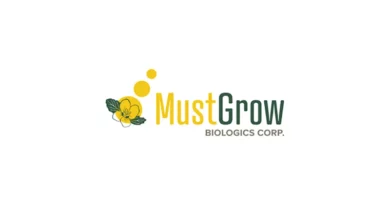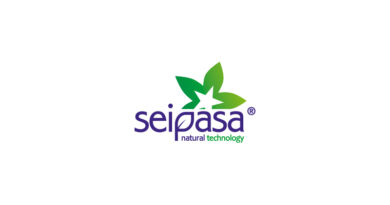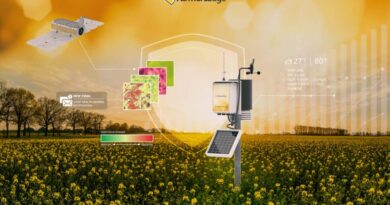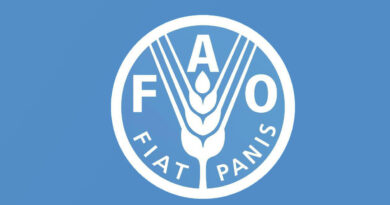Mustgrow Biologics Advances Its Mustard Plant-based Technology Pipeline
09 December 2020, Saskatoon, Canada: MustGrow Biologics Corp. (CSE: MGRO) (OTC: MGROF) (FRA: 0C0) (the “Company“, “MustGrow“) is pleased to provide an overview of its natural plant-based mustard-derived biopesticide technology product pipeline. MustGrow has harnessed the mustard seed’s natural defense mechanism to develop and commercialize biopesticide technologies to control diseases, pests and weeds.
Also Read: Kamterter receives Syngenta 2020 FarMore® Vision Award
REMINDER: MustGrow is hosting a live investor webcast TODAY at 11:00am ET to discuss upcoming catalysts.
Register/View: https://event.webinarjam.com/channel/MUSTGROW
Please sign-in 5 minutes prior to commencement.
Participants will be muted and anonymous.
Please email questions to info@mustgrow.ca to be addressed following the presentation.
With patented plant-based organic biopesticide technologies, MustGrow is aiming to disrupt global agriculture markets that have traditionally been dominated by potentially dangerous chemistry-based products. MustGrow’s existing patent portfolio protects both method-of-use and composition-of-matter claims for MustGrow’s signature mustard-derived approach to controlling unwanted diseases, pests and weeds.
MustGrow’s Crop Protection and Food Preservation Programs:
| PRODUCT | TARGET | MARKET | STAGE |
| Pre-Plant Soil Biopesticide | Soil-borne diseases & pests | ||
| Fruits & Veg, Turf & Ornamentals, Potatoes, Tobacco | Fusarium, Botrytis, Verticillium, Rhizoctonia, Pythium, Phytophthora, Sclerotinia, Nematodes, etc. | US$1.2 Billion est global market in Fruit & Veg | U.S. EPA registration is in process for multiple crops; Pre-Launch |
| Canola | Clubroot Disease (Plasmodiophora brassicae) | C$500 Million est economic loss in Canada | Advanced Development / Field Trials |
| Bananas | Fusarium wilt TR4 | US$18 Billion est global loss | Early Development / Greenhouse |
| Pulse Crops | Aphanomyces | C$100 Million est economic loss in Canada | Proof-of-Concept / Laboratory |
| Non-Selective Bioherbicide | Noxious or resistant weeds | US$13 Billion est global market | Early Development / Greenhouse |
| Stored Potato & Vegetable Sprout Inhibitor* | Sprouting, diseases & pests | US$100 Million est global market | Early Development / Laboratory |
| Storage Biopesticide for Bulk Grain* | Mycotoxin and insects | US$15 Billion est global loss | Proof-of-Concept / Laboratory |
| Storage Biopesticide for Shipping Containers* | Fungus and invasive pests & diseases | US$2 Billion est global market | Proof-of-Concept / Laboratory |
| Biopesticide for Food-Borne Pathogens* | E.coli, Salmonella, Listeria, Staphylococcus | US$15 Billion est global market | Proof-of-Concept / Laboratory |
Table Source: Globenewire, Cirrus Partners, MustGrow estimates.
*Literature shows AITC has application in these areas. MustGrow is looking forward to testing its natural AITC technologies.
Pre-Plant Soil Treatment for Fruits & Vegetables / Seeking U.S. EPA Registration: MustGrow has the advantage of already having an existing U.S. EPA registration for its biopesticide in “granule format” for use as a pre-plant soil treatment of diseases and pests in crops such as fruits & vegetables, turf & ornamentals, potatoes and tobacco. The Company is now using this existing registration data to obtain a new registration in “liquid format”. EPA registration approval is targeted for 2021.
Bananas / Fusarium wilt TR4: MustGrow recently announced 100% control in the laboratory of Fusarium wilt TR4 (Panama Disease) utilizing its mustard-derived biopesticide. Fusarium wilt TR4 is a devastating disease pathogen ravaging the $25 billion global banana industry. Currently, there are no effective treatments for infected banana plantations, which can cause 100% yield loss. Additional program advancements, both in the laboratory and field, are expected Q1-2021.
Non-Selective Bioherbicide: MustGrow has filed key patents and announced proof-of- concept data related to a biological non-selective bioherbicide (weed killer), a timely development, as market-leading synthetic herbicides face high-profile legal and regulatory challenges. A series of MustGrow’s application rate tests achieved herbicidal control after only 72 hours – killing the plants from the root up. Additional program advancements are expected Q2-2021.
Canola / Clubroot Disease: MustGrow has confirmed in a greenhouse setting over 98% control of Clubroot spores in 24-hours on both soil and plants. The Company anticipates completing further greenhouse testing this winter and commencing field trials in spring-2021. Clubroot is a rapidly-spreading disease pathogen destroying canola, one of Canada’s more profitable crops. Once a field is infested, there are no economical control measures currently available, with some field infections leading to 100% crop loss.
Stored Potato & Vegetable Sprout Inhibitor: MustGrow recently announced the exclusive patent licensing from the University of Idaho pertaining to mustard-based treatment of stored produce and other foods, particularly sprout suppression of potatoes. The Company anticipates testing its AITC technology on potato sprouting and diseases in the laboratory this winter-2021. With positive results, further testing will take place in greenhouse and then field. The current annual product sales in the European sprout suppression market is estimated at US$64 million and over US$100 million globally(1). The leading agrochemical product for sprout suppression, chlorpropham (“CIPC”), was banned by the European Union on Oct. 8, 2020. MustGrow has identified logical partners in relevant global regions based on food product characteristics and economics.
(1) Cirrus Partners research.
The World is Ready for Biopesticides
Widely-used synthetic chemicals continue to be banned or deregistered globally. The U.S. EPA promotes and encourages the use of safer pesticides, requiring much less data to register a biopesticide. The European Commission is seeking to halve the use of chemical pesticides by 2030. Leading agriculture companies have recently established venture capital programs to fund, partner or acquire early-stage technologies focused on biopesticide and bioherbicide crop protection. Research firm Markets and Markets sees the global biopesticide market size doubling to US$8.5 billion by 2025.

